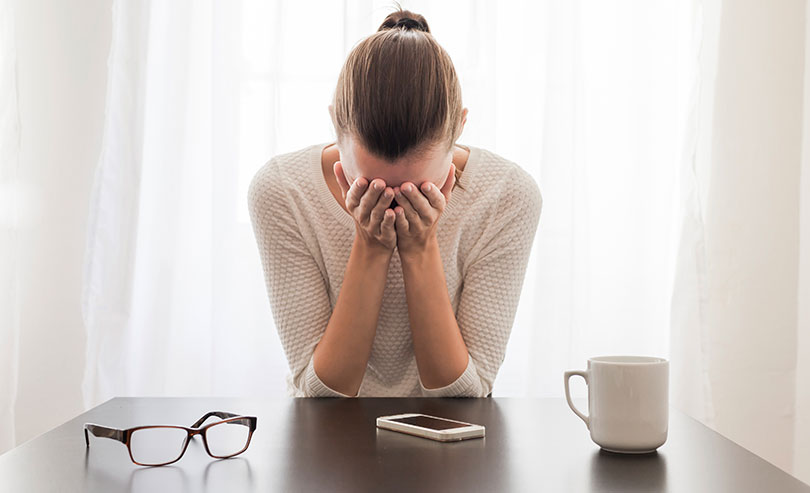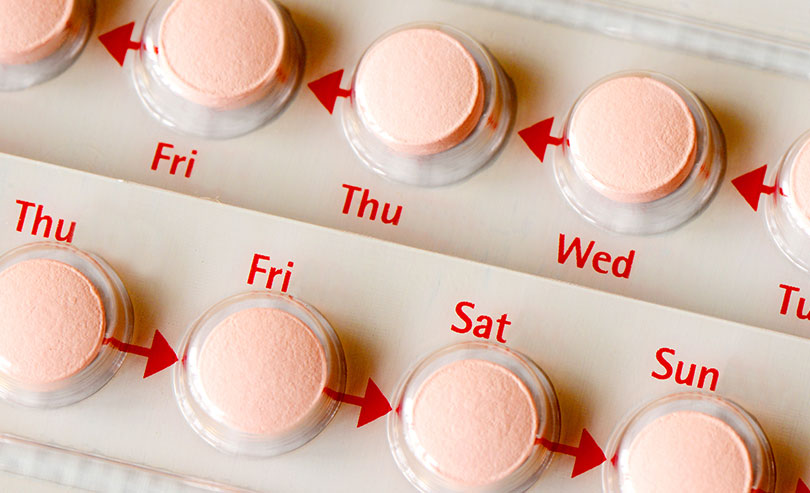Photo Credit: 4774344sean / istockphoto.com
Menopause and Depression
Thinking about menopause can trigger a range of feelings, from fear and frustration to confusion. This response makes a lot of sense, because the beginnings of menopause mark a major shift in the way your body operates and functions.
Over the years, you have become accustomed to your regular monthly cycle. It hasn’t always been comfortable, but it has been consistent. Now, it seems like everything is changing.
Perimenopause has started, and since then it feels like nothing has been consistent. Your periods are inconsistent. The way you feel physically is inconsistent. The way you feel mentally is inconsistent. Even the people who have been so steady in your life seem to be reacting to you differently.
Change is hard. Change is stressful. Change forces you to reevaluate yourself, your life and the world that surrounds you. With all of the change, it can be impossible to tell who you are anymore. Your sadness grows as your interest in doing things shrinks. Your sleep increases as your patience decreases.
Find out what the link between menopause and depression is.
Menopause/ Depression Overlap
From perimenopause leading up to menopause and the time following it, you will be at greater risk of depression and depressive symptoms including lower moods, lower energy, less motivation to do things that you enjoy, change in appetite and weight, change in sleep patterns and duration, increased irritability and less ability to pay attention and concentrate.
Many women experience high levels of doubt as their self-image changes from who they were to who they are now. Some women during this time may also experience thoughts of death or suicide. Surely, if you ever think that suicide is an appropriate course of action, seek out professional help.
The risk of depression comes from the overlap in symptoms that menopause and depression share. It is a common occurrence for the world of mental health and physical health to overlap.
Other Stressors
Another possible explanation for depressive symptoms during menopause is the link to other stressors in your life. Women in their mid-40s typically experience several profound changes in lifestyle. Any one of these is enough to create havoc in your life. In combination, they become quite a force.
The first shift you may undergo is related to your children leaving the home. You may have been dreaming of this day for some time, but empty nest syndrome can create feelings of loneliness and changed self-esteem.
A related change involves your career goals. Many women have had to balance home and work for years. Now that children are less dependent, you can devote more time to work, which can bring negatives as well as positives.
Failing health of your parents is another change. Having to care for them can divert energy from your own needs. Poor health and death can extend to the loss of friends and family members. These transitions will increase stress, possibly making menopause symptoms and depressive symptoms worse.
Menopause/Depression Solutions
For someone moving through the stages of menopause, there is a lot to think about, feel and do. The problem is that you only have so much time and energy to put towards improving your state. Because of this, you need to be as efficient as possible to find the benefit you are looking for. Luckily, because of the symptom overlap, many of the techniques you use to improve your menopause symptoms will also improve your depression symptoms.
If your doctor thinks the menopause and fatigue is the problem there are steps you can take to improve your energy levels.
Acknowledging the loss that accompanies menopause is a great place to start. Even if you lose something that you are not particularly fond of, there is still a sting. Loss often begins with feelings of shock, confusion, anger and sadness. Your body is undergoing a significant transformation and your psychological health is changing. Trying to convince yourself that “everything is fine” puts more pressure on yourself and leads to more depression.
Accepting the reality of your state is helpful. Over time you can find methods to reinvest emotional energy towards positive and productive direction.
Once you accept the loss, you can begin looking at menopause in a more neutral way by focusing on the benefits. You already know that the list of negatives associated with menopause is a long one, so listing positive aspects of menopause can change your point of view.
Consider the idea that menstruating is a chore. No more periods means no more PMS. You no longer have to spend your money on feminine hygiene products. Find ways to add up the savings and treat yourself to something you’ll enjoy. Also, there is a freedom found in menopause. Many women believe sex is more enjoyable without the chance of pregnancy.
After you begin to have a more positive view of menopause, you can add flexibility to your life. Flexibility is essential when trying to stabilize your mood. Clinging to biased ideas of how things used to be, how you used to feel and how people used to treat you will only keep you stagnant. These views create a rigid and static self-concept. You are not the person you were 10 or even five years ago, and you shouldn’t try to be. Explore new facets of yourself and the world around you. Take the class that you have been too busy to enroll in until now. Go to more movies.
Now that you are looking forward instead of back, reassess your supports. Anytime there is a new stressor, your supports are put to a new test that challenges their abilities. Who or what would be able to improve your mood or other symptoms? Supports can be helpful people, comfortable places or useful things. Seek them out, and use them to the best of your (and their) capabilities.
Asking for help can be an uncomfortable process, but one that puts your pride behind you. Tell your supports what you are experiencing and what you are looking for. They cannot read your mind or understand the intensity of your symptoms.
You and your supports might benefit from increased education on the subject of menopause. Your husband may be a loving, caring man who is interested in helping you. Maybe his only crime is lacking the resources needed to make a difference.
If your current supports are unable to assist, seek out new caring people or situations. Support groups, both in person and online, are a good option if your social network is small. Professional supports like therapists can assist in a number of ways and have specialized training to understand and assist in major life transitions. Outside options exist for those willing to look.
Sometimes the measures to improve your mood or overall well-being can be a bit abstract and hard to grasp for some people. In these situations, look for measures to improve your physical health. These help because the benefits will be more visible and tangible.
Take the example of sleep. Many women dealing with symptoms of menopause report poor sleep. This makes sense because night sweats and hot flashes are very uncomfortable. When sleep is poor, irritability, confusion and anxiety can follow. Work towards solutions to improve sleep. Always consult your doctor but consider supplements and herbal remedies. Experiment with ice or a cool cloth to increase your comfort.
If you find success at bedtime, you can transition some of the effective coping skills to use during the day when symptoms are high. This way you can feel more control over your symptoms. Fewer physical symptoms will lead to fewer mental health symptoms. With lower symptoms, you can find ways to be a newer, better version of you post menopause.







